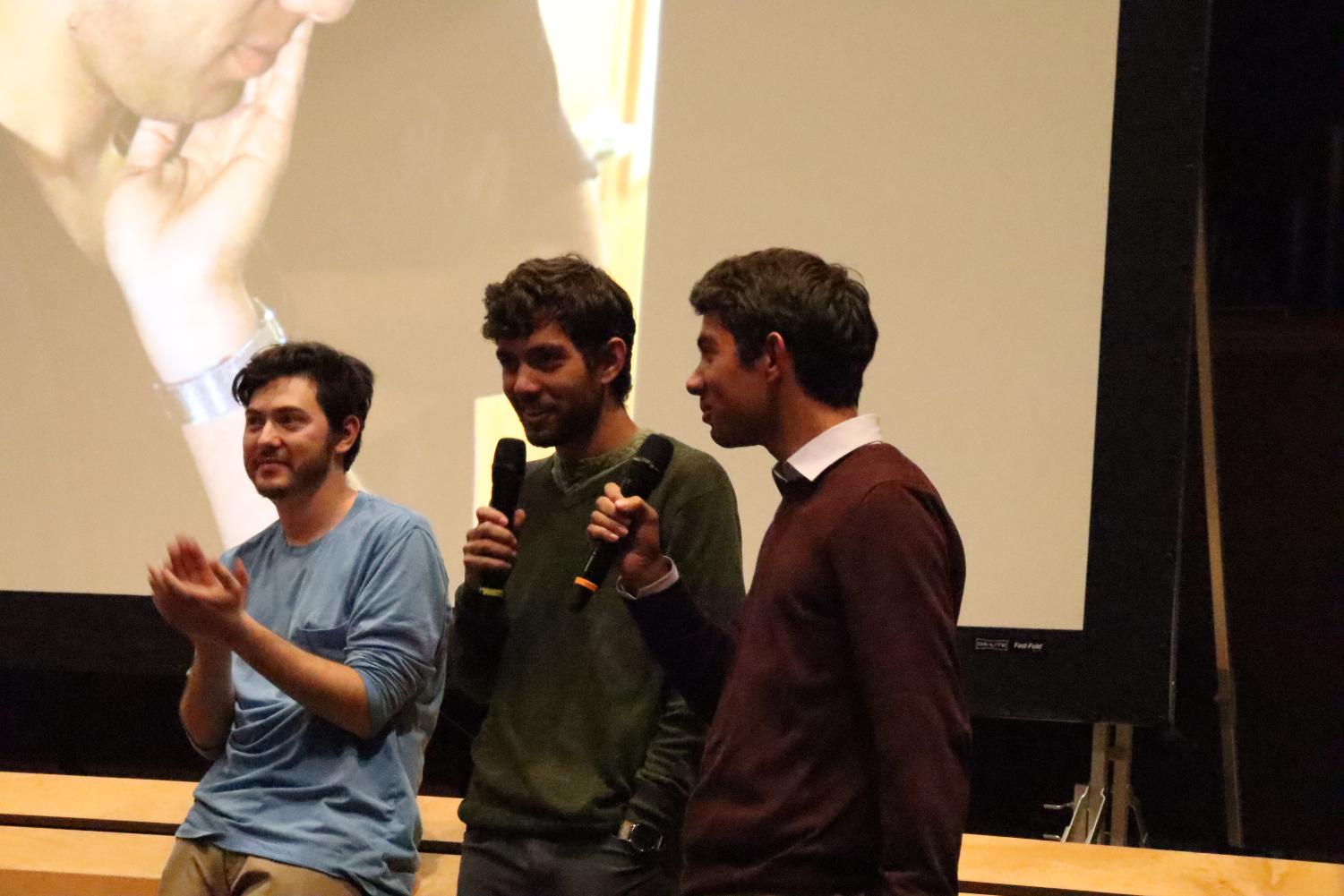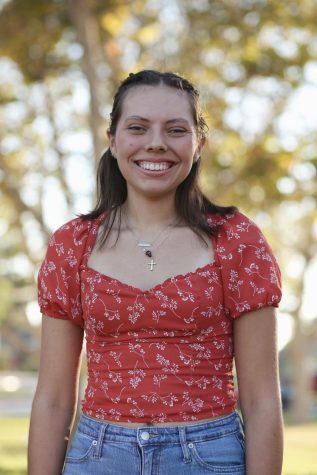On Thursday, Nov. 17, Biola students, along with family and friends, attended the premier of three short films in the Crowell Music Hall. As people gathered around the front of the building in anticipation to take their seats, the growing buzz plunged the supportive attendees into fervent pride and excitement. The familial setting created a welcoming atmosphere and guests were invited to celebrate the films with dessert and conversation afterwards.
The premier specifically focused on the films of three cinema media arts students — “First Chair,” directed by seniors Ethan and Luke Montgomery; “La Bouilloire,” directed by senior Raleigh Van Natta and “What I Live For” directed by sophomore Cole Deppe. In addition to each of these films, there was a surprise showing of “An Odd Take” that was also directed by Cole Deppe. To create a cinematic experience for the audience, four previews were shown prior to the premier featuring the two Biola films: “Ever-Flowing” and “Sisters” in addition to “Segment 006” and “Aunt Nancy and Old Man Trouble.”
LA BOUILLOIRE
Starting off the evening, “La Bouilloire” left audiences in fits of laughter due to the satirical nature of the film. The film itself is intended to be a critique of art films and the many cliches within them. The film initially started in January of 2021 as a project for a class that asked students to film a five minute scene in a single shot. The satirical nature of the short was especially funny to film students as it critiqued many of the overused techniques found in the film industry.
“It starts out as this sort of edgy cerebral art film sort of feel about this guy who’s suffering this recent loss. But then over the course of one of the early scenes, he realizes that he doesn’t understand any of the specifics of his own tragedy and it comes out that he is stuck in an art film,” Van Natta said. “[The main character] and his friend have to escape this pretentious art form in order to be able to get home and so it sort of brings to light a lot of the overused cliches or tropes in films that you see a lot in this industry.”
Van Natta explained that the viewing of “Meshes of the Afternoon” in Professor Nate Bell’s class while studying a sub-genre of experimental films inspired the inception of the short film. After the overly complicated meaning of the avant-garde film confused and frustrated him, Van Natta created his own to emulate the essence of pretentious films.
“I want to try to remind people that movies are fun, that we should have fun making them and have fun watching them,” said Van Natta. “We don’t always have to take them as seriously as we think.”
FILMING
While the film was shot by a phenomenally small crew of only two people, Van Natta explained the importance of getting as many hands on set as possible for future films to help with the execution of filming. Another key factor that was important to note about the film was how the film was written with the actors in mind.
“I wrote [“La Bouilloire”] knowing that [Jon Ganji and [Micah Weightman] would be playing these characters, but they still managed to bring an entirely new life to them that I hadn’t expected,” said Van Natta. “There were a lot of improvised lines on set that made it into the movie because they were so much funnier than stuff that I could have thought of.”
After a series of changes in post-production even up until the day of the premier, Van Natta found it most rewarding to hear people react and laugh at things he found entertaining in the film.
“I want to try and make people think about ways that their own films or the films they like are sort of guilty of this — always drawing from the same well or reusing the same tropes over and over again, or thinking that things are artistic even when maybe they’re not that creative,” Van Natta said.
WHAT I LIVE FOR
While “What I Live For” also started off as an assigned project for class, it explores a very different side of film with a focus on documentaries and finding one’s passion. While Deppe originally intended for the film to be about a Biola philosophy professor, Gregg TenElshof, the focus shifted to tell the story of Deppe’s passion for film.
Two of the film’s most noteworthy features are its remarkable shots and symbolism.
“The desert captures that place where you feel like you don’t have any answers to stuff and life feels way more complex than you thought,” said Deppe. “Then, eventually you get your grasp again and find another truth that you can hold to and arrive on the other side of complexity to this new, more rich simplicity.”
After creating the film, Deppe said he felt that he was able to express himself through the film and leaned into communicating through his craft.
“Suddenly, it seemed like something beyond me where I had captured my ideas and put them into a film and someone else could watch it and get their own thing and I didn’t need to talk to them, I could just show them,” said Deppe.
Although Deppe hit creative blocks in making his vision come to life, he noted that he continually met with Professor Wells throughout the process to piece together the documentary and the shots he compiled.
“I really feel like I can only take credit for half of how it came together and I feel like God was in it in a lot of ways,” said Deppe. “The ants [seen in the film] represent things in nature that are designed to do good work. Later on I saw that it matched what the professor was saying and it just ended up working out that way.”
DIRECTING A DOCUMENTARY
Deppe explained that he is currently interested in creating narratives and sees many transferable skills in directing a documentary and being able to connect it to an audience through narrative storytelling. Around the same time as completing “What I Live For,” Deppe also worked on another project titled “An Odd Take” that took a more relatable approach towards the same theme — overcoming doubts and pursuing your passion despite uncertainty of how it will turn out.
“I want to continue to move over to a place where I’ve got characters that are doing completely different stuff from me but still I relate to them,” Deppe said.
For both filmmakers and non-filmmakers, Deppe hopes that people are able to take away from the short film that God has good works for everyone to do no matter what they pursue.
“At the end of the day, if you don’t feel like you are succeeding in what you’re passionate about or you’re not getting recognition for something you’re putting your heart and soul into, you’re still doing something good for God,” Deppe said.
FIRST CHAIR
Brothers Ethan and Luke Montgomery, who spearheaded the planning for the event and brought the three films together for the premier, directed the final film of the evening, “First Chair.” The film is about a clarinet player who is trying to keep her spot as first chair in the school band when a new player joins.
The inspiration for the film derives from both of the Montgomery brother’s experiences in band growing up and a common thread throughout all of their films — how the desire to be known can get in the way of one’s true self. While the brothers pointed out how orchestras are often seen in film due to the theatrical aspects of their performances, they really wanted to put their focus on including a symphonic band in the film. The film includes a special appearance from the Biola Symphonic Winds and now retired Biola Band Director, Bob Feller.
Ethan Montgomery spoke about the rewarding aspects of working with a smaller crew and creating a tight knit, family-like atmosphere on set. The Montgomery brothers also spoke about the difficulties finding the lead actress, played by junior cinema and media arts major Jin Kim, and an original song for the film, written by senior fine arts major Molly Pederson. The brother’s utilized social media to allow musicians to submit pieces for the original short film. After gaining a variety of different pieces, they felt that Pederson’s piece was fitting for the film.
Luke Montgomery also mentioned the satisfaction in being able to put into action what they have learned about making films with a fairly small production crew and budget. “It’s rewarding in the sense that it gives me confidence that we could [create films] after film school when we don’t have … all the resources that we have [at Biola] to continue to make films without spending an arm and a leg,” said Luke Montgomery.
In organizing the event, the brothers found joy in being able to promote their own work and also celebrate some of their peers’ accomplishments as well. Luke Montgomery explained that after hosting a premier in a similar format last year for their film “Amelia (the Twin),” they were told they should host another event in the same fashion.
“We got advice from somebody that we should premiere our film with other films so that you get double the audience and you get more run time,” said Ethan Montgomery. “But more than that, the spirit of the event was so positive and so much better than a film festival. A great film festival can be fun and about celebrating the work but they often can feel kind of political and all your relationships are kind of superficial.”












